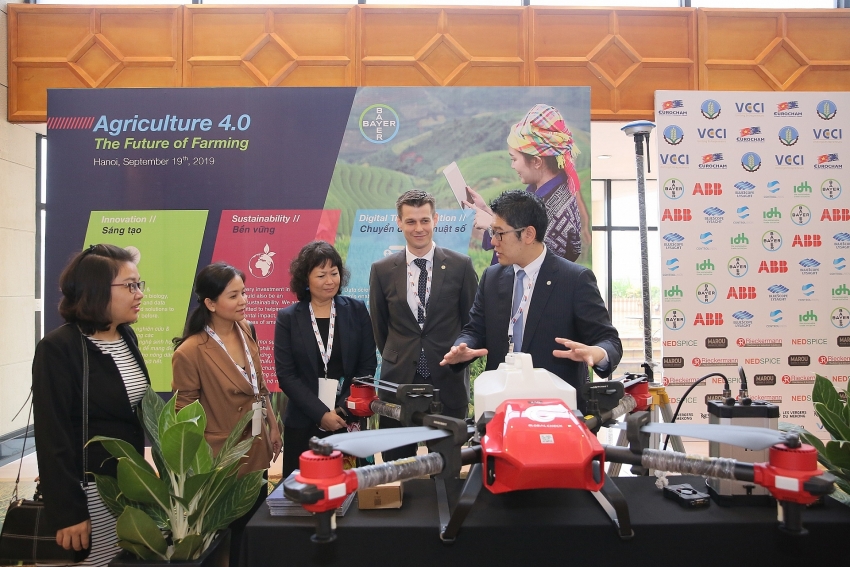Bayer accompanies sustainable agriculture in Vietnam
|
On June 30, the Vietnam-EU Free Trade Agreement (EVFTA) and the Vietnam Investment Protection Agreement (IPA) were signed, opening opportunities to further penetrate 28 European markets full of potential for Vietnam's products, especially agricultural products. Through the two agreements, the EU and Vietnam have also agreed to strongly develop sustainable development measures.
This co-operation and legal cohesion will not only help Vietnam attract more foreign investors but also provide opportunities for people to access high-quality products that meet international standards. This is also an opportunity for the Vietnamese agricultural sector to access innovation and technology, enhance sustainability in agriculture through improving productivity and quality, and contributing to sustainable economic development.
Digital agriculture – the key to European markets
Penetrating Vietnam in 1994, Bayer, the world's leading corporation in digital farming technology, has always been committed to accompanying the Vietnamese government in promoting digitalisation for sustainable agriculture. Prior to the EVFTA, Bayer realised that it was the time for Vietnamese agricultural products to improve their competitiveness to seize opportunities as soon as the agreement came into effect.
“70 per cent of Vietnam's food resources are produced by small farmer households on a small area of cultivation. It is clear that our digital solutions have offered great opportunities to accelerate sustainability in agriculture. It is a critical agenda of Bayer to help smallholder farmers produce more with fewer resources,” Kohei Sakata, Customer Experience and Digital Strategy head for the Asia-Pacific region at Bayer Crop Science, shared at the Vietnam-EU Forum on Sustainable Agriculture – Agriculture 4.0: Key to the European Market held recently.
According to Kohei, in digital solutions, drones can just spray the field with crop protection products to prevent farmers from being exposed to chemicals. This will also ensure a very correct spray to the field, helping avoid the overuse or disuse of chemical products. “Drones can also save on water consumption because they use limited amounts of valuable water. Last but not least, drones are not only cost-efficient to operate but can also be a great solution for the labour shortage.”
Besides, recently, within the framework of the Rice Value Chain programme between Bayer and Trung An commune of Kien Giang, Bayer signed an exclusive strategic co-operation agreement with Trung An to jointly promote the local application of unmanned aerial systems in agriculture and provide customised plant protection services to help improve cultivation capacity and control residues in high-quality rice production, targeting the export market. Initially, the pilot project was been implemented for two years (from May 2019 to April 2021) on 200 of the total 800 hectares.
Apart from that, Bayer is working on a joint project with and key stakeholders to accompany the development of sustainable agriculture in Vietnam. The activities include increasing farmers’ capabilities and application of high technology in digital farming, targeting crops favoured for exportation to EU markets to support the coming EVFTA, covering coffee, pepper, rice, and fruits.
Agriculture adapts to climate change
Not only contributing to the increasing competitiveness of Vietnamese agricultural products in the international market, Bayer's digital solutions also actively support Vietnamese farmers to adapt to climate change.
The abnormal change of natural conditions not only makes it difficult for farmers to select and take care of crops, but also increases agricultural pests. In this context, Bayer has launched a list of seeds that can resist pest attacks, for example, Fall Army Worm (FAW) in corn. Thanks to these technologies and solutions from Bayer, farmers can not only protect the yields but also their livelihood.
Besides these, Bayer uses social media to share information and solutions to help thousands of farmers protect crops and improve their livelihood.
Particularly, in the Central Highlands region, Bayer has implemented the coffee rejuvenation project realising that 20 per cent of Vietnam's coffee plantation area was ageing and production is reduced by 30-40 per cent. Bayer’s method is using drip irrigation, a perfect solution for nutrients, pesticides, and water to be delivered directly to the roots of the plants, thereby saving water, reducing costs, and managing risks.
“I have replanted 250 trees with 100 per cent success level. In the past, with the traditional method, the success rate was only 50 per cent. Particularly, this new method also helps me reduce costs, control pests and diseases,” said Tran Van Nhien, a farmer who participated in the pilot project.
Meanwhile, in the Mekong Delta region, to help farmers produce and cultivate in the context of increasing saline intrusion and floods, Bayer has launched Arize rice that is resistant to falling down, to salinity, and drought with yield up to 20 per cent higher than current rice varieties.
“Thanks to new technologies available now, we believe that we can really help support the generation changes in agriculture to enable a more sustainable food supply chain to feed the growing world population,” said Sakata.
What the stars mean:
★ Poor ★ ★ Promising ★★★ Good ★★★★ Very good ★★★★★ Exceptional
Related Contents
Latest News
More News
- Masan Consumer names new deputy CEO to drive foods and beverages growth (February 23, 2026 | 20:52)
- Myriad risks ahead, but ones Vietnam can confront (February 20, 2026 | 15:02)
- Vietnam making the leap into AI and semiconductors (February 20, 2026 | 09:37)
- Funding must be activated for semiconductor success (February 20, 2026 | 09:20)
- Resilience as new benchmark for smarter infrastructure (February 19, 2026 | 20:35)
- A golden time to shine within ASEAN (February 19, 2026 | 20:22)
- Vietnam’s pivotal year for advancing sustainability (February 19, 2026 | 08:44)
- Strengthening the core role of industry and trade (February 19, 2026 | 08:35)
- Future orientations for healthcare improvements (February 19, 2026 | 08:29)
- Infrastructure orientations suitable for a new chapter (February 19, 2026 | 08:15)


 Tag:
Tag:


















 Mobile Version
Mobile Version